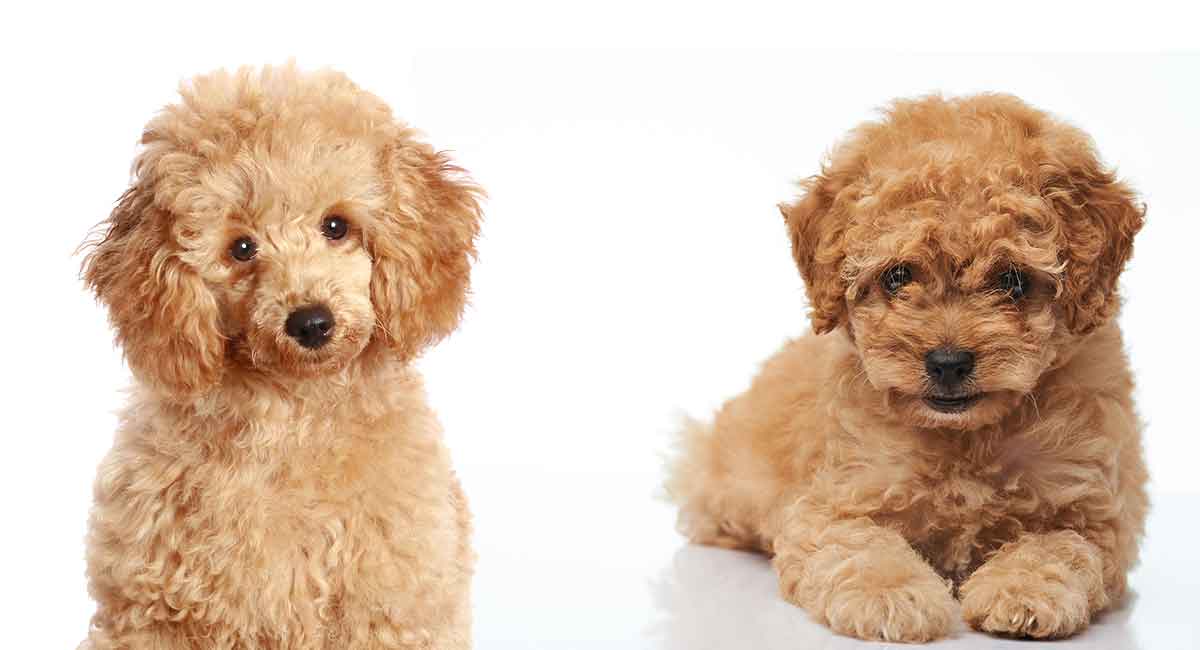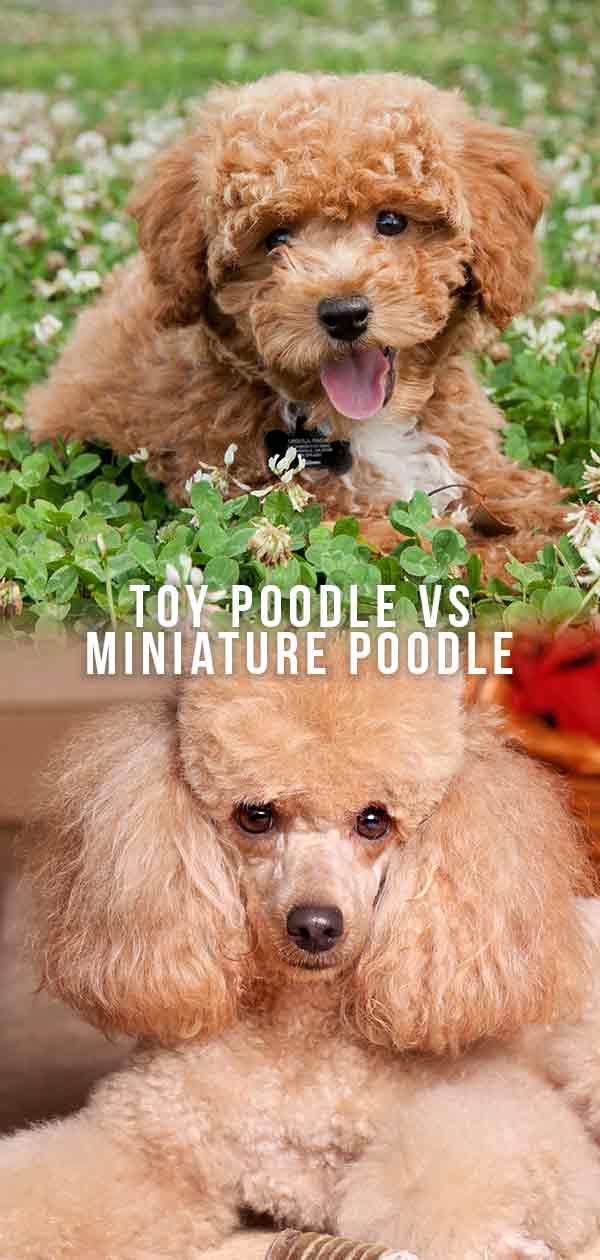
Today we are going to break down the differences between the Toy Poodle vs Miniature Poodle. Looking at what sets them apart, and what they have in common. We will help you to decide which version of the gorgeous Poodle is the right pet for you, your family and your lifestyle.
We’ll look at whether their differences go beyond just size. Investigating their history, temperaments and health conditions. Poodles after all, are smart, cute, and dignified, and they tend to shed less than other breeds. But they come in three rather different forms. What’s the difference? Welcome to our guide that’ll explain it all.
Contents
- Is the only difference height?
- Which is friendlier?
- Is one healthier than the other?
- Which makes a better pet?
Toy Poodle vs Miniature Poodle History
As you might imagine, the history of the Miniature and Toy Poodles are mixed with the history of the regular sized, or Standard, Poodle. The Standard Poodle is an old European breed, used for hunting and retrieving waterfowl. Eventually, these dogs became the canine companion of choice for French nobility, and thus the national dog of France.
Standard Poodles have been around since the 15th century, at least. By the 18th century they were the main companion dog in Spain. Starting in the 18th century, smaller Miniature Poodles started becoming popular as companions in French royal houses. In the 20th century, Toy Poodles started being bred in the U.S. as a good companion for people who lived in cities.
All three sizes of Poodle are recognized by the American Kennel Club and the British Kennel Club. Both the Miniature and Toy are simply considered smaller varieties of the Standard, and are bred to the same standards. However, some studies show that Miniature Poodles from North America may be a distinct breed compared to Standard Poodles!
Toy Poodle vs. Mini Poodle Appearance
Standard Poodles are generally considered to be more than 15 inches at the shoulder. They set the size standard for Poodles in general, in that the other types of Poodle are compared to the Standard to determine which variety they are.
Miniature Poodles should generally be between 11-15 inches at the shoulder. Toy poodles are even smaller than that, at 10 inches tops! Size is really the only difference in appearance between these dogs. All three breeds carry the same official breed standard. They have curly, dense hair and are usually of solid colors. Blues, grays, silvers, browns, cafe-au-lait, apricot and creams, sometimes in varying shades. Poodles carry themselves proudly, look alert, and are elegantly well-proportioned.
Toy Poodle vs. Miniature Poodle Temperament
All poodles are active, intelligent dogs. They are known for their steady and calm nerves and hardy constitutions. They make wonderful companions and do well if treated as part of the family. Poodles are very people-oriented and may suffer from separation anxiety. You should know that as working dogs, they have stronger marking and hunting drives than many companion breeds.
Poodles are generally not aggressive and thus are fine with other animals and children. But the smaller the poodle, the more careful you must be to teach kids proper handling and playing. So, for small children, Miniature Poodles might be your best bet. You might expect the smaller dogs to be more likely to bark, but this isn’t necessarily true. All poodles can become habitual barkers without training or enough attention.
Toy Poodle vs Mini Poodle Training
Poodles are eager to please and quick to learn, which makes them very trainable. You may think that, as these are smaller dogs, they don’t need as much training or socialization. But with Poodles, that’s not necessarily the case.
Poodles have a tendency toward excessive bonding with their owner, and don’t do well alone for long periods of time. Socialization can be super important to stave off separation anxiety. Additionally, some lines of Poodles can be high strung or shy. Socialization can be important in helping to overcome these personality quirks.
Poodles are agile and graceful and benefit from training in agility, obedience, and tracking activities. You should be consistent and positive with them since Poodles can be sensitive as well. This goes for all varieties of Poodle size, toy and miniature.
Toy Poodle vs Miniature Poodle Exercise
Both Toy and Miniature Poodles should have some exercise every day, and plenty of mental stimulation. As hunting, working dogs in their past, they can get easily bored. They have a high energy level and love activity. They can be even livelier than the Standard Poodle! Both poodles may benefit from fetching games and walks with their humans. They will probably enjoy swimming and retrieving. Still, because of their size, their exercise requirements can be different.
Miniature Poodles might need to stretch their legs a bit more than Toy Poodles. Indoor play and short jaunts outside might be enough for the tiny Toys. However, both types of dog will still need plenty of mental exercise. And those agility, obedience and tracking activities mentioned before are good for their minds and their bodies.
Toy Poodle vs. Miniature Poodle Health
Miniature and Toy Poodles are both generally fairly sturdy little dogs. A history of good breeding means these dogs generally live long and healthy lives. Their life expectancy runs about 10-18 years.
Interestingly, Miniature Poodles have more genetic diversity than Standard Poodles. This may make them even slightly healthier than their larger counterparts. But you should know that Toy Poodles, because of their small bones and size, are more likely to suffer from injury. Their size makes them more fragile.
Genetic issues
All poodles are prone to certain genetic issues. These include certain autoimmune disorders including Addison’s disease, and sebaceous adenitis, which is an inflammatory disease affecting hair follicles. These also include epilepsy, hip dysplasia, diabetes, hepatitis, hypothyroidism, atrial septal defect (of the heart). And a bleeding disorder called von Willebrand’s disease.
They may also experience eye disorders. Miniature and Toy Poodles also experience certain orthopedic problems. Especially Legg-Calvé Perthes (a bleeding disorder of the hips), and luxating patellas. With Miniature and Toy Poodles, recommended health tests include a hip evaluation, an ophthalmologist evaluation, a PRA optigen DNA test, and a patella evaluation.

Toy Poodle vs. Miniature Poodle Grooming
Poodles are a low-shedding breed, but this does not mean they have low grooming needs. Poodle coats must be brushed daily completely to the skin in order to keep from matting near the roots. If you don’t do this, your dog’s hair may eventually have to be shaved because it has gotten too matted!
This is often why many Poodle owners take their Poodles to be professionally groomed once or twice a month. You must take this into account if you want a Poodle of any size. An alternative is to keep the coat very short. This may work well in the summer.
If you have allergies and want a hypoallergenic dog, choose your puppy carefully. Although the Poodle’s infrequent shedding means that they cause fewer reactions in allergic people, they are not truly allergy free. If you have allergies, doctors recommend that you expose yourself to the individual dog you want and see how you react to him specifically.
Which Breed Makes A Better Pet?
Honestly, if you’re trying to decide between a Miniature and Toy Poodle, there’s really just one main factor to consider: size. These aren’t separate breeds. They are simply different size varieties of the same breed.
Do you want your dog to be under 10 inches at the shoulder, or above? A smaller dog will require less exercise because she’ll have smaller legs. The Toy Poodle is slightly more fragile, and thus may be a better option for older kids who can treat a puppy more gently.
The Miniature Poodle is still on the small side, but will require a bit more exercise. Miniature Poodles are sturdier than Toy Poodles, which may be a consideration for certain people. Yet both dogs are relatively healthy, lively, smart, affectionate creatures that can make great additions to your household.
Any differences in terms of health, temperament, personality and other aspects of the dogs will be down to individuals, or to the breeders. Thus, it’s important for you to look for the most responsible breeders you can find. You should make sure your breeder has no issues with you visiting or with providing the health testing information for both parents of your potential pup.

Gea says
You don’t mention shih-poo. I just said goodbye to my wonderful female shih poo. 16 years minus 2 weeks. She was awesome. Very healthy till the end. And due to poodle part, no short nose. She loved to fetch ( I had to set a time, because she would NEVER give up) and was a great swimmer. Hikes and biking.she was game for everything.
Hamilton says
Because shih-poo is a mutt, not a recognized breed. Duh. If she were to mention all the -poos and -oodles, this would be a never ending article because poodles have been crossed with way too many other breeds.
zDoanna says
Thank you for your post, I wholeheartedly. agree.
Ruthie says
This article says: “These aren’t separate breeds. They are simply different size varieties of the same breed.” So if a dog has two toy poodle parents, but he grows to 14 pounds and 12″ at the shoulder, does that make him a mini poodle?
Teddy says
I wonder the same. Would a tall toy poodle become a mini?
Pat says
I’m a Vietnam Vet with a few issues. I recently lost my best friend Max sand now looking to down size some. I was thinking of a mini or toy Poodle to be with me. I am on a fixed military income so if prices can be kept a little on the lower side that would be great.
Thanks Pat
ruth niswonger says
I’m looking for a tiny toy poodle female apricot if possible I’m on a fixed income
Darlene says
Looking for tiny toy. Retired on fixed income, so price is a factor. I am mostly alone at home everyday. Would prefer adult female dog. Retired breeder would be fine, however I will have her spaded. No desire for puppies or bleeding drops as she will be my lap dog and sleep in my bed with me.
Gwendolyn says
Iam 77years I live along I just had neck Brace I need something to be friend someone to walk with I feel so alone my children and grandchildren are all gone
Sharon Moody says
I am looking for a red toy female poodle in around Kentucky or Indiana.
Manasa Tangalin says
Looking for a female red toy poodle puppy in California. I can drive to pick it up. Do you have any available or are any expected soon?
Patricia Smith says
Hi I live in Kingston Tasmania. I am after a Toy poodle to love & give a good home too . I am on a disability pension & suffer several mental health illnesses. I live alone & suffer agoraphobia, ptsd, ocd, Bipolar , high anxiety & depression. Loneliness is the biggest thing and need a companion.
Suzy McDonnell says
Do you have the poodle still
Carol Poole says
Loved reading this, so informative. Thank you
I would love a toy poodle…